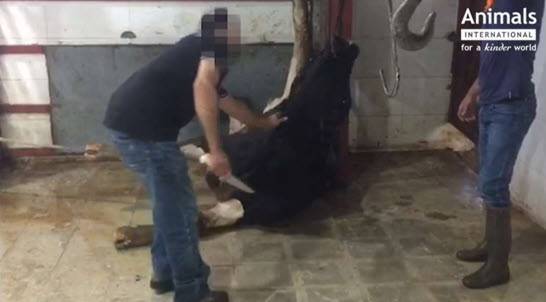
A new film produced by a group of NGOs entitled Live Exports: Beyond Borders, Beyond Imagination has been shown in the EU Parliament.
During slaughter in the Middle East, North Africa and Turkey, the film indicates that even minimum welfare standards are ignored. Cattle are roughly beaten with sticks – including on the head and face – to force them to the ground. In Egypt, slaughtermen often sever cattle’s leg tendons with a knife to control the animals. They even jab their knife into the head and eyes of the cattle. Often a chain is tied round one of a bovine’s rear legs.
The fully conscious animal is then hoisted up, dangling upside-down from one back leg, ready for slaughter. Throat cutting is often carried out with blunt, short knives leading to the throat being cut with multiple sawing movements.
The scenes in the film are not exceptional, says Ethical Farming Ireland (EFI). They show the systematic neglect of fundamental animal welfare standards in most slaughterhouses in the Middle East, North Africa and Turkey.
The video has been timed as MEPs are beginning their consideration of the Commission’s proposed new regulation on the protection of animals during transport.
“The proposed regulation is disappointing as it will allow the EU’s inhumane live exports trade to continue with only minor improvements in animal welfare safeguards,” says EFI.
The film aims to persuade MEPs to strengthen the proposed regulation by banning the export of live farm animals to non-EU countries.
The EU exports around one million cattle and nearly three million sheep a year mainly to the Middle East, North Africa and Turkey. Ireland exported over 30,000 bovines outside the EU in 2024. Key problems during transport include:
• No contingency plans in the event of transport delays and import refusal at borders of third countries. Lengthy delays can arise at the EU-Turkey border if there are problems with the animals’ paperwork or health status. Turkey will not allow the animals to be unloaded until the problems are addressed, and EU animal health laws do not permit rejected animals to re-enter the EU.
• Prolonged sea journeys can last 5-10 days and in the worst cases up to 16 days. Documents seen by EFI show animals suffer from heat stress, respiratory illness (the main cause of death) leg injuries, ringworm, gastric disorders and harmful gases such as ammonia.
Despite its claim to have some of the world’s highest welfare standards, other countries have banned live exports:
• Australia has banned live sheep exports by sea from May 2028
• The UK has banned live exports for slaughter or fattening
• New Zealand has banned all live exports by sea
• A Brazilian Judge has ruled that no live animals should be exported from Brazil’s ports in part because slaughter practices in the Middle East would be illegal in Brazil. This ruling is being appealed and so for now Brazil’s trade continues.



